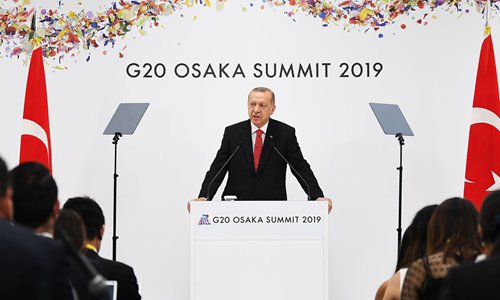HOME >> OPINION
Erdogan’s China visit aims at giving a shot in arm to Turkey’s economy
By Li Weijian Source:Global Times Published: 2019/7/1 18:28:39

Photo: VCG
Turkish President Recep Tayyip Erdogan begins to visit China on Tuesday just days after the G20 summit in Japan. Erdogan met Chinese President Xi Jinping on the sidelines of the Conference on Interaction and Confidence-Building Measures in Asia Summit in Dushanbe, Tajikistan on June 15. Why are the top leaders of both countries meeting twice within a month?
Erdogan's visit to Beijing is related to issues such as Ankara's conflict with the administration of US President Donald Trump, but his main concern is the economy.
Currently, both China and Turkey are encountering difficulties. There has been a perceptible change in China-US trade tensions after Washington decided to put tariffs on hold, but nothing suggests a thaw in ties between Ankara and Washington. Washington's sanctions on Tehran have cast a shadow on the economies of China and Turkey, as both countries are important importers of Tehran's oil.
Ankara is experiencing an economic slowdown. The Erdogan administration may want to consult China on ways of dealing with the effect of US sanctions on Iran. Meanwhile, Erdogan is seeking more economic cooperation with China, hoping Beijing can lend a helping hand in dealing with US sanctions on his country and the pressure they have created. The sanctions in 2018 led to a sizable depreciation of the lira, Turkey's currency, which fell to a record low.
Ties with the US continue to worsen over Ankara's decision to purchase a Russia S-400 missile defense system. Ankara took the decision after weighing political considerations as it sought a diverse strategy.
Actually, Turkey's relations with the US have not only deteriorated recently. In 2016, the Turkish government formally requested Washington to arrest and extradite Islamic preacher and staunch Erdogan opponent Fethullah Gulen, who lives in the US and has been accused of masterminding the 2016 attempted coup against Erdogan. The US did not accede to the request, citing insufficient evidence, which angered Turkey.
Furthermore, since Trump took office, the Erdogan administration has not seen eye to eye with many moves of his administration, such as those on Syria and Iran. The US armed and supported Syrian Kurds, while Turkey believes Kurds are a threat to its national security.
Although it cannot be said that Turkey has fundamental differences with the US, Ankara's estrangement with the Trump administration is quite apparent. The clash with the US has affected foreign investment in the country. If left unresolved, economic woes could jeopardize the re-election of Erdogan. To secure his power, he has to prioritize the economy.
Further cooperation with China would help Turkey come out of the economic mire. As Turkey lies at the crossroads of the West and East, it has realized it could gain from the China-proposed Belt and Road Initiative (BRI). Turkey has cooperated with China in many projects under the BRI framework. A Chinese company has won the bid to build a part of a high-speed railway from Ankara to Istanbul. The country has also signed a deal with Chinese telecommunications company ZTE on the project to build Istanbul's new airport.
Turkey is at odds with the US and its desire to strengthen ties with big powers such as China and Russia as leverage against Washington is clear. Nonetheless, Turkey's relations with the US will not undergo a fundamental shift. It just wants to have more options beyond Washington to seek greater benefits.
The author is a research fellow with the Institute for Foreign Policy Studies of the Shanghai Institutes for International Studies, and vice president of the Chinese Association of Middle East Studies. opinion@globaltimes.com.cn
RELATED ARTICLES:
Posted in: VIEWPOINT